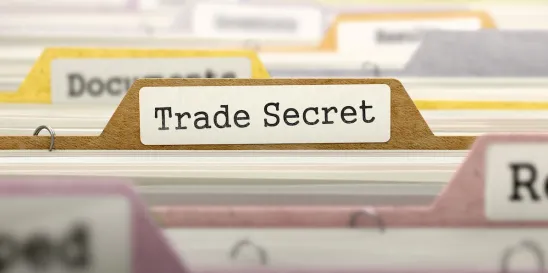We are proud to present Greenberg Traurig’s Trade Secrets 2023 Year in Review, a high-level overview of some of 2023’s most significant trade secret decisions in the United States.
2023 started with a bang, when the Federal Trade Commission proposed a rule banning noncompete agreements between employers and “workers” (broadly defined to include employees, independent contractors, interns, and others). If adopted, the proposed rule would bar both prospective and existing noncompete agreements. As of this writing, there is no indication as to when the FTC will issue a final rule.
The FTC was not the only rulemaking body seeking to make changes in 2023. On Sept. 1, California’s governor signed Senate Bill 699 into law, creating section 16600.5 which explicitly extends section 16600’s prohibition on noncompete agreements to contracts signed out of state. Effective Jan. 1, 2024, section 16600.5 states that “[a]ny contract that is void under [section 16600] is unenforceable regardless of where and when the contract was signed.” The amendment goes so far as to impose civil violations against employers or former employers who enter into or attempt to enforce a contract that is void under section 16600. On Oct. 13, the governor signed Assembly Bill 1076 into law. Effective Jan. 1, 2024, this bill creates Section 16600.1, which explicitly makes noncompete agreements unlawful in California.
Notably, in 2023, the courts were clear that trade secrets remain entitled to protection. For example, in TWC Concrete, LLC v. Decarlo, the Southern District of Ohio held that forwarding confidential information to a personal email address in violation of an employment agreement alone constituted the unauthorized use of a trade secret. Likewise, the Eighth Circuit held that pleading a trade secret claim on information and belief was sufficient to survive a motion to dismiss in Ahern Rentals, Inc. v. EquipmentShare.com.
2023 also saw several significant dismissals. For example, in Pauwels v. Deloitte LLP, the Second Circuit affirmed dismissal where plaintiff disclosed a trade secret based on informal oral understanding as opposed to a formal written non-disclosure agreement. In Nulogy Corp. v. Menasha Packaging Co., the Seventh Circuit affirmed dismissal where the contract between the parties contained an exclusive forum selection clause. These decisions underscore the need for written agreements tailored to protect trade secrets and provide access to the judicial system.
Noteworthy 2023 Federal Cases
Ahern Rentals, Inc. v. EquipmentShare.com, 59 F.4th 948 (8th Cir. 2023)
Plaintiff sued two competitors in the construction equipment rental industry, alleging on information and belief that the competitors misappropriated its trade secrets. The district court dismissed plaintiff’s complaint against both defendants for failure to state a claim, concluding that allegations pled only on information and belief are insufficient. On appeal, the Eighth Circuit Court of Appeals held that “the district court erred by summarily rejecting [plaintiff’s] allegations” simply because they were pled on information and belief. The Eighth Circuit explained that such allegations are permissible if they are “based on information that is within the possession and control of the defendant or are supported by sufficient factual material that makes the inference of culpability plausible….”
Highland Consulting Grp. v. Soule, 74 F.4th 1352 (11th Cir. 2023)
This case originated in the Southern District of Florida where the plaintiff (a consulting group) sued the defendant (a former employee) for misappropriation of trade secrets under the Defend Trade Secrets Act (DTSA). At trial, the jury returned a $1.2 million verdict in favor of the plaintiff. On appeal to the Eleventh Circuit Court of Appeals, the defendant contended that the plaintiff failed to prove that it (as opposed to one of the plaintiff’s foreign affiliates) was the owner of the trade secrets at issue, as the DTSA required, and that “the district court erred in denying his motions for judgment as a matter of law, or alternatively for a new trial on this ground.” The Eleventh Circuit rejected the defendant’s contentions and concluded that the trial record contained sufficient evidence to support a finding that the plaintiff owned the trade secrets at issue in the case. Namely, each page of the trade secret documents was stamped with the plaintiff’s marketing name. Moreover, testimony from the plaintiff-corporation’s owner regarding the documents was such that a jury could reasonably infer that the plaintiff owned the documents, notwithstanding that plaintiff’s foreign affiliates also used the documents containing the trade secrets.
Nulogy Corp. v. Menasha Packaging Co., No. 22-1583 (7th Cir. Aug. 7, 2023)
The Seventh Circuit Court of Appeals affirmed the district court’s dismissal of the plaintiff’s trade secret claims against a defendant based on a forum-selection clause agreed upon between the plaintiff and the defendant in a software licensing contract. The forum selection clause provided, “The Parties will initiate any lawsuits in connection with the Agreement in Toronto, Ontario, Canada, and irrevocably attorn to the exclusive personal jurisdiction and venue of the courts sitting therein.” The plaintiff argued that its American-based trade secret claims fell outside the scope of the forum selection clause because these claims were unrelated to its contract with the defendant. The Eighth Circuit refused to read the forum selection clause so narrowly, explaining that the plaintiff’s complaint relied heavily on the existence of its contractual relationship with the defendant: “Plaintiff suggests it never would have provided the confidential information central to its claims absent the contract, and any claims regarding the information’s misuse therefore bear a strong connection to the agreement.”
Pauwels v. Deloitte LLP, 22-21-cv (2d Cir. Oct. 6, 2023)
The Second Circuit upheld an order dismissing plaintiff’s trade secret misappropriation claims for failing to adequately allege his device was a trade secret. In arguing that the Pauwels Model Spreadsheet was a trade secret, plaintiff argues (1) he sent the Pauwels Model Spreadsheets only to a core group of individuals at Bank of New York Mellon Corporation (BNYM), and only when necessary to illustrate the basis for his advice; (2) two of the BNYM employees with whom he shared the spreadsheets orally agreed to keep them and the model secret; (3) in many instances, he placed his initials on the spreadsheets that he provided to BNYM; and (4) on two occasions, when he refused BNYM's request to share the spreadsheets with third parties, BNYM complied. Despite these facts, the court noted that the complaint was devoid of allegations that plaintiff password protected, encrypted, or expressly labeled his spreadsheets as confidential. One fact that significantly undercut plaintiff’s argument in the court’s opinion was the fact that he had sent his Pauwels Model Spreadsheets to three other individuals at BNYM from whom he did not receive any assurances. Moreover, the fact that the agreements to keep the Pauwels Model Spreadsheets confidential were mostly oral and informal understandings as opposed to formal non-disclosure agreements further undercut plaintiff’s argument. Finally, the court stated that the BNYM employees’ agreeing not to share the spreadsheets with third parties when plaintiff asked them not to was insufficient to demonstrate the existence of an enforceable trade secret because plaintiff disclosed those spreadsheets to those individuals at BNYM, and even if an informal understanding was in place, the BNYM employees were under no legal obligation to keep the materials secret.
Syntel Sterling Best Shores Mauritius Ltd. v. Trizetto Group, Inc., 68 F.4th 792 (2d Cir. 2023)
The Second Circuit overturned a $284 million unjust enrichment verdict for compensatory damages, holding that avoided costs damages are not available where a permanent injunction effectively stops the use of the trade secret, and the misappropriation does not diminish the trade secret’s value. Factors the court said it would consider in future cases for determining whether to apply avoided cost damages would be the extent to which the defendant had used the trade secret in developing its own competing product, the extent to which the defendant’s misappropriation had destroyed the secret’s value for its original owner, and the extent to which the defendant could be stopped from profiting further from its misappropriation into the future. The court rooted its decision to overrule the award of avoided cost damages in the fact that Trizetto did not lose the value of its misappropriated trade secrets, as Trizetto could not offer any evidence to show that Syntel’s misappropriation diminished the value of its trade secrets to any degree.
TWC Concrete, LLC v. Decarlo, 1:23-cv-345 (S.D. Ohio June 30, 2023)
The U.S. District Court for the Southern District of Ohio held that the forwarding of confidential information to one’s personal email address in violation of an employment agreement alone constitutes the unauthorized use of a trade secret. Moreover, the court found that the financial statement that included confidential budget information, customer names, contract values, and estimated costs of the contracts derived independent economic value from not being generally known or readily ascertained by competitors. The financial statement was also subject to reasonable efforts to maintain secrecy, as it was only distributed to 13 people—all of whom signed confidentiality agreements. Given the adequate protections afforded the financial statement, the court concluded it constituted a trade secret, the defendant’s act of forwarding it to his personal email satisfied the definition of unauthorized use of a trade secret, and since irreparable harm is presumed when it is shown a defendant misappropriates a trade secret, a temporary restraining order was justified.
Noteworthy 2023 State Cases
Hanneman Fam. Funeral Home & Crematorium v. Orians, 2023-Ohio-3687 (Ohio Oct. 12, 2023)
The Ohio Supreme Court held that information available in the public domain does not satisfy Ohio’s six-part test to determine whether information constitutes a trade secret. The court specifically noted the information at issue was filed on an annual basis with the state and therefore readily ascertainable by the public. The Ohio Supreme Court further held that the Ohio UTSA preempts common law tort claims based on trade secrets.
Johnston v. Vincent, 2021-01196 (La. Feb. 15, 2023)
The Court of Appeal, Third Circuit, Parish of Calcasieu reversed the lower court and held that customer lists containing revenue information constituted a trade secret. Specifically, the court held that under Louisiana’s three-part test, the lists were a trade secret where defendants failed to produce evidence of their awareness of the value of hundreds of customers on the list. The court held that misappropriation of a trade secret violates the Louisiana Trade Secret Act.
Total Quality Logistics, LLC v. Leonard, 220 N.E.3d 225, 232 (Ohio July 3, 2023)
The Ohio Supreme Court reversed the trial court’s denial of plaintiff’s motion for summary judgment on its claim that defendant breached her noncompete agreement when she left plaintiff for a competitor and solicited customers while on paid administrative leave in violation of a temporary restraining order. Under Ohio law, a noncompete will be upheld where it is necessary to protect an employer’s legitimate interest, including (1) “to prevent the disclosure of a former employer’s trade secrets or the use of the former employer’s proprietary customer information to solicit the former employer’s customers” and (2) “the retention of employees in which an employer has invested time and other resources.” The court held that a post-employment restriction on competition is reasonable so as long as it (1) is no greater than required for protection of the former employer, (2) does not impose undue hardship on the employee, and (3) is not injurious to the public.




 />i
/>i

